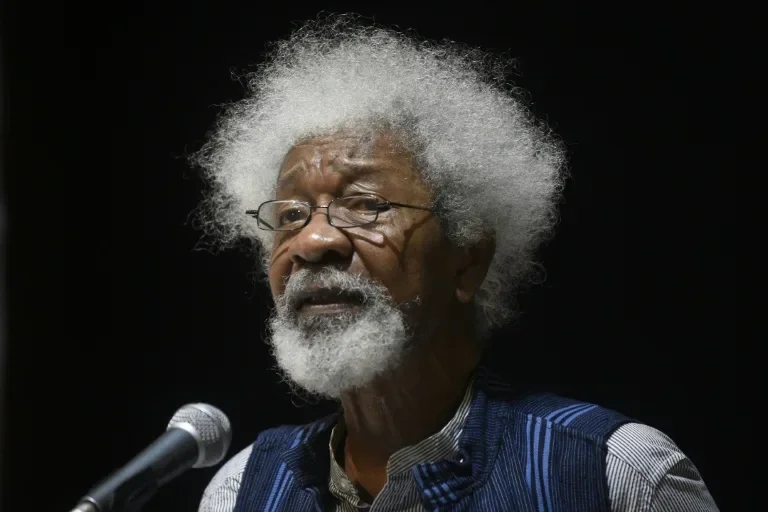Imagine this: a 90-year-old literary legend, Africa’s first Nobel Prize winner, standing before a packed room in Lagos, holding a single sheet of paper that just shut the door to America.
That’s exactly what happened on Tuesday when Wole Soyinka announced the revocation of his U.S. visa.
At Freedom Park, during a fiery session called “Unending Saga: Idi Amin in Whiteface!”, Soyinka didn’t just break the news, he read the official letter aloud, word for word. The document, dated October 23, 2025, from the U.S. Consulate in Lagos, stated his B1/B2 visa (issued in April 2024) was no longer valid due to “additional information” that surfaced later.
“This is not a personal attack,” Soyinka said calmly. “It’s a consequence of speaking truth to power, especially when that power sits in the White House.”
A History of Standing Tall
Soyinka has never been silent. In 2016, right after Donald Trump won the presidency, he made global headlines by publicly tearing up his U.S. Green Card in protest.
“I will not live under a regime that promotes hate,” he declared then.
Now, nearly a decade later, the U.S. government has responded, not with debate, but with a visa ban.
He laughed off speculation about secret crimes:
“No drugs, no scandals, just words. Dangerous words, perhaps.”
Soyinka has spent a lifetime using those words to fight tyranny from Nigeria’s civil war to apartheid in South Africa. He was imprisoned for 22 months during the Biafran conflict, surviving on smuggled food and writing poetry on toilet paper.
What the Visa Letter Actually Says
Here’s the key part Soyinka read aloud:
“The non-immigrant visa listed below has been revoked under U.S. regulations (22 CFR 41.122). It is no longer valid for travel to the United States.”
-
Name: SOYINKA, WOLE
-
Date of Birth: 13-JUL-1934
-
Visa Type: B1/B2
-
Issued: 02-APR-2024, Lagos
No explanation. No appeal process mentioned. Just final.
No Anger, Just Open Doors
Despite the snub, Soyinka holds no grudge.
“Any American with honest intent is still welcome in my home,” he smiled. “Let them come to Nigeria. We have tea, ideas, and plenty of space for real conversation.”
He refuses to reapply. “Why beg for entry into a country that fears criticism?” he asked. Instead, he’ll host global forums in Lagos, inviting thinkers, writers, and activists to Africa’s beating heart.
A Legacy Bigger Than Any Border
Wole Soyinka isn’t just a name he’s a movement.
-
First African Nobel in Literature (1986)
-
Author of over 30 plays, poems, and memoirs
-
Professor at Harvard, Yale, and Oxford
-
Survivor of solitary confinement and exile
His pen has toppled dictators, inspired revolutions, and shaped modern African identity. A visa cancellation? It’s a footnote.
The Bigger Question: Can Words Get You Banned?
This isn’t just about Soyinka. It raises a chilling question:
Can governments silence critics by closing borders?
In an age where visas are weaponized against journalists, students, and artists, Soyinka’s story sounds a global alarm.
He ended the event with a line that echoed through the hall:
“They can take my visa, but they’ll never take my voice.”
And the world is listening.
Should speaking out cost you a visa? Tell us your view!
READ ALSO: Judge Blocks Deportation of Salvadoran Man Amid Legal Battle






